http://www.amazon.co.uk/Representations-Female-Images-Womens-Magazines/dp/3639093844/ref=sr_1_1?s=books&ie=UTF8&qid=1323349895&sr=1-1
cant stop , wont stop by Jeff Chang
they have a right to speak in the way its coming up. Hip hop is the voice of the generation. Even if you didnt grow up in the bronx in the 1970 its still there for you.
" Rappers want to be so bling bling . Are you really living a luxury life ? dont you have other issues?
‘’It brings white kids together with black kids with yellow kids, they all have something in common that they love.’’
Check the technique
Hip hop models (alternatively: hip hop honeys; video girls[1]) are female models who appear in hip-hop-oriented music videos and related men's magazines, calendars, award shows, beauty pageants, or live performances. Many video models are aspiring actors, singers, dancers, or professional models. Their reasons for appearing in rap videos can vary, with most hip hop models hoping to gain commercial exposure and make a living. Other video models work for free and have a brief moment in the limelight.[2]
http://en.wikipedia.org/wiki/Category:Female_rappers
http://en.wikipedia.org/wiki/Nicki_Minaj
Onika Tanya Maraj, known by her stage name Nicki Minaj, (pronounced /mɪˈnɑːʒ/; born December 8, 1982) is a Trinidadian-born American recording artist. She was born in Saint James, Trinidad and Tobago, and moved to the Queens borough of New York City when she was five years old.
After releasing three mixtapes between 2007 and 2009 and being signed to Young Money Entertainment in August 2009, Minaj released her debut album, Pink Friday in November 2010. It quickly became a commercial success, peaking at number one on the U.S. Billboard 200 and being certified Platinum by the Recording Industry Association of America (RIAA) a month after its release.[2][3] She became the first artist to have seven singles on the Billboard Hot 100 at the same time.[4] Her second single, "Your Love", reached #1 on the Billboard Hot Rap Songs chart, making Minaj the first female artist to top the chart unaccompanied since Missy Elliott accomplished it with Work It in 2002.[5] She also became the first female artist to be included on MTV's Annual Hottest MC List.[6] Minaj was named the 2011 Rising Star by Billboard.[7]
Minaj released her first mixtape in 2007 after releasing Playtime Is Over with Dirty Money Records. She released another mixtape on July 7, 2008, titled Sucka Free, under the label Be.
Misogyny in hip hop culture http://en.wikipedia.org/wiki/Misogyny_in_hip_hop_culture
Misogyny in hip hop culture refers to lyrics, videos or other aspects of hip hop culture that support, glorify, justify, or normalize the objectification, exploitation, or victimization of women.[1] Misogyny in rap music instills and perpetuates negative stereotypes about women. It can range from innuendoes to stereotypical characterizations and defamations.[2] Overt misogyny in rap music emerged in the late 1980s, and has since then defined the music of numerous hip hop artists.[2]
Hip hop has had a tremendous influence on modern popular culture, saturating mass media through music videos, radio broadcasts, and a variety of other mediums. Rap music is by far the most popular music genre for 8- to-18-year-olds.[3] Gangsta rap, the most commercially successful subgenre of hip hop,[4] has been particularly criticized and associated with misogyny.[5
Bitches ain’t shit but hoes and tricks / Lick on these nuts and suck the dick / Get’s the fuck out after you’re done / And I hops in my ride to make a quick run.
- ^ Weitzer & Kubrin 2009, p. 10.
- ^ a b c d e Adams, Terri M. and Douglas B. Fuller (2006). "The Words Have Changed but the Ideology Remains the Same: Misogynistic Lyrics in Rap Music". Journal of Black Studies 36 (6): 938-957. DOI: 10.1177/0021934704274072.
Music historically has been a medium for human social expression.This social expression can take many forms, from trimph and hope to utter fraustarion and despair
Misoygynitic lyrics of gansgsta raps are hateful indeed , but they do not represent black culuture nor do they fundementally from women hatingdiscoureses that are common amounsgt white men. The danger of this insight is that it might be read as a black migosny.
Johnson 1996


